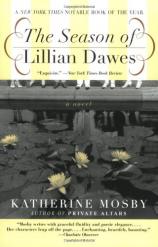Excerpt
Excerpt
The Season of Lillian Dawes

There is in most lives, a defining moment, a point dividing time into before and after -- an accident or love affair, a journey or perhaps a death. For Spencer, all four, like the points on a compass, combined in the shape of Lillian Dawes. And because it is not possible to witness a tragedy without carrying away some of its stain, she became my watershed as well.
I was seventeen when the Renwick School for boys decided, despite my family's long affiliation with the school, to discharge me midterm. My father had died the year before, and out of deference to his name, and perhaps also his bequest, they had kept me on through a number of earlier infractions. However, when I was caught smoking a cigar in the chapel after curfew, it was plain I had exhausted the sympathy due my orphaned state. The masters were so eager to return me to what remained of my family that rather than wait for my aunt Grace to retrieve me at the end of the weekend, they sent me to New York, to my brother Spencer, which amounted to divine intervention in my opinion.
Spencer was ten years older than I, at boarding school by the time I was able to say his name. Our relationship therefore had been forged on holidays, in equal measures of jealous admiration on my part and amused affection on his. Spencer had assumed, at the time of our mother's illness, the role of family diplomat, a position for which he was singularly suited: his wit and lean good looks made him a favorite among even the most petulant of relatives, and his indifference to his status only furthered it. That is, until he declined to pursue his role professionally: after a brief stint with the State Department, he renounced his interest in foreign affairs. Then, much to everyone's surprise, Scribner published a slim collection of essays Spencer had written his final year at Yale, entitled Apropos of Nothing. Our father particularly, and the family generally, understood these two events as a repudiation of the tradition that had put Gibbses in the Senate, the Supreme Court, and two European embassies in the last century. It was also noted, a bit hysterically, that Spencer omitted from his wardrobe the hat and sock garters that were the mark of a gentleman.
Spencer's decision to go to law school had mollified my father initially; it was still possible for Spencer to “come around.” But after graduating with honors, Spencer went to Italy, where he spent the next several years translating the obscure Renaissance poet Lapadini into English for an academic publisher.
It was at that point that Spencer's past underwent review, and then revision: childhood activities, earlier thought to indicate promise, were now taken as signs of oddity. For example, the Christmas pageants he had written for Hadley (our only cousin, five years my senior and five years Spencer's junior) and me to perform, featuring spectacular death scenes involving pomegranate explosions, were now seen to be morbid, though at the time he had been praised for the ingenuity of his plots and the historical accuracy. It should also be said that at the time, the relatives were so grateful to Spencer for having found a way of keeping Hadley and me occupied that they would have applauded a reenactment of atrocities far more tasteless than those Spencer actually chose.
Spencer's fall from grace, such as it was, did not, as I had initially feared, put greater pressure on me to succeed. It had, in fact, the opposite effect. I think it was felt that if Spencer, with all his gifts, could become a disappointment, then it was better not to hold out any major expectations for an ordinary fellow like myself. Indeed, it seemed to excuse my own lackluster efforts in the classroom and on the playing field because a precedent had been set'if I was not achieving my potential, it was because Spencer had squandered his. I might have felt guilty about letting my own failures fall on Spencer's shoulders, but I didn't. At the time, I felt relief.
Spencer met me at the station and took me to the Oak Room for dinner. Not only did he let me order a drink, but after the meal had been cleared, he offered me a cigar.
“I hear you've developed a taste for these.”
“Actually, it was Bixby's idea,” I explained, taking the cigar. “He was outside taking a leak when Mr. Thrush came in, which is why I was caught and he got off.”
“Gabriel,” Spencer said quietly, holding out a match for me to light the cigar,
“I don't give a damn if you smoke cigars and I don't think your expulsion is a world-class tragedy. And I am happy to take you in for the remainder of the term, only don't try to bullshit me.”
He blew the match out just before it singed his fingers and dropped it disdainfully in the ashtray.
Excerpted from The Season of Lillian Dawes © Copyright 2002 by Katherine Mosby. Reprinted with permission by HarperCollins. All rights reserved.
The Season of Lillian Dawes
- paperback: 288 pages
- Publisher: Harper Perennial
- ISBN-10: 0060936959
- ISBN-13: 9780060936952







